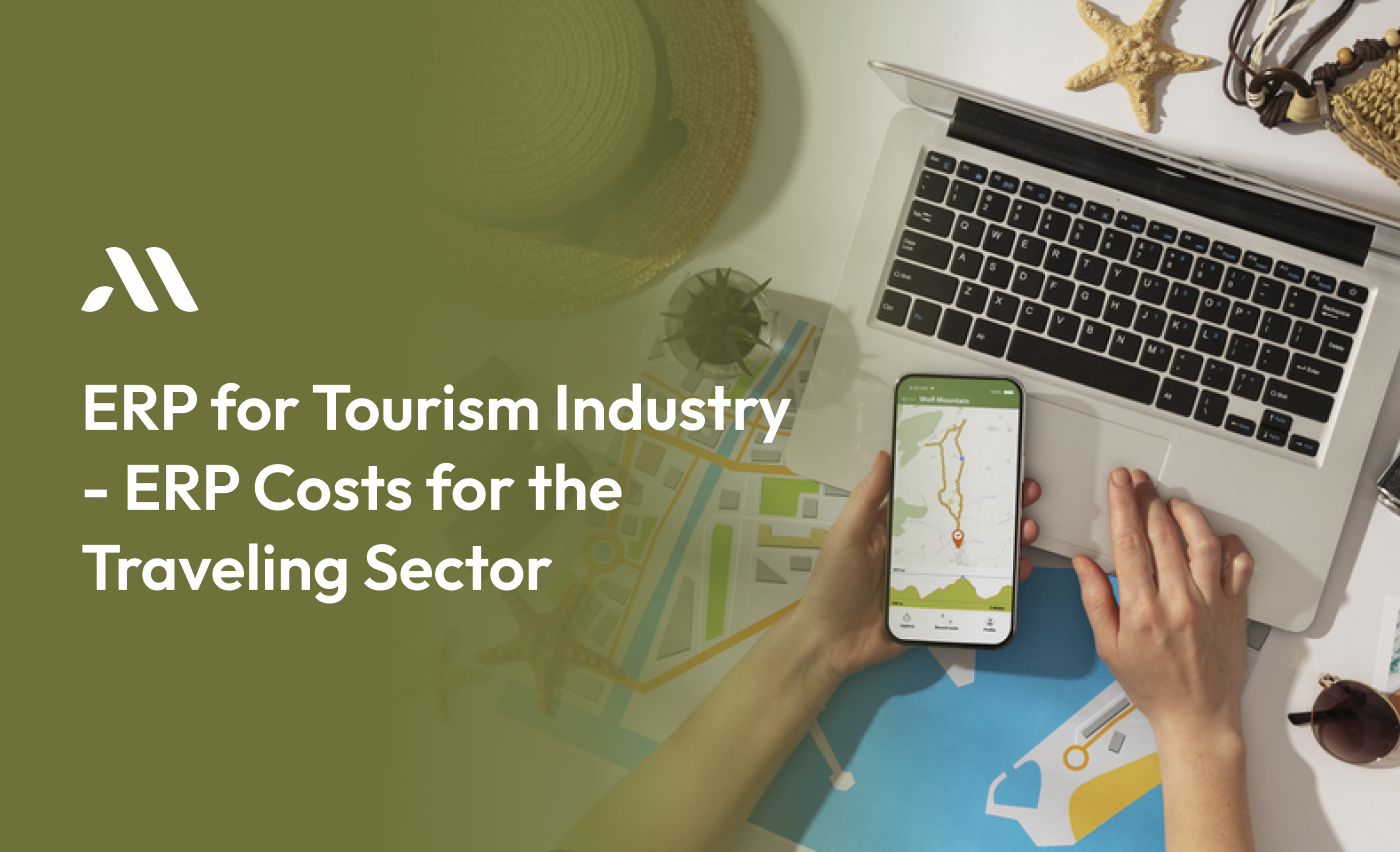Hello travel agents and travel business owners! Are you looking to make your work easier and grow your business? Today, we're going to talk about something called ERP. ERP stands for Enterprise Resource Planning. It might sound big and complicated but don't worry. We will break it down so you can understand it easily.
ERP is like a super helper for your travel business. It can manage everything from bookings to customer information, all in one place. This makes your job easier and helps your business run smoothly. But, how much does this super helper cost? Let’s jump into ERP costs for the traveling sector.
What is ERP for the Tourism Industry?
ERP for the tourism industry is a special software designed to help travel agents and travel business owners. It helps you manage your bookings, customer information, payments, and much more. Imagine having all your important information in one place, easy to find and use. That's what ERP does for you.
Why Do You Need ERP in the Traveling Sector?
As a travel agent or travel business owner, you have a lot to manage. There are bookings to handle, customers to keep happy, payments to track, and so much more. It can be overwhelming. This is where ERP for the tourism industry comes in handy.
Benefits of ERP for the Traveling Sector
1. Better Communication:
ERP systems can help everyone in your travel business communicate better. For example, if one person makes a booking, everyone else can see it right away. This means there are no mix-ups or double bookings.
2. Detailed Reports:
ERP systems can make detailed reports for you. These reports can show you how well your business is doing. For example, you can see which tours are the most popular or which times of the year are the busiest. This information can help you make better decisions for your business.
3. Easy Access:
With a cloud-based ERP system, you can access your business information from anywhere. This means you can work from your office, home, or even while you’re traveling. All you need is an internet connection.
4. Security:
ERP systems can keep your important business information safe. They have security features to protect your data from being lost or stolen. This is like having a lock on your door to keep your valuables safe.
Understanding ERP Costs
Now, let’s talk about ERP costs. Just like when you book a vacation, ERP for the tourism industry comes with a price. But, how much does it cost? Let’s break it down.
Initial Setup Costs:
This is the cost you pay to set up the ERP system. It includes installing the software and training your staff to use it. Think of it like setting up a new office or buying a new car. You pay a one-time fee to get everything ready.
Subscription Fees:
Some ERP systems charge a monthly or yearly fee. This is like paying for a magazine subscription. You keep paying as long as you use the ERP system.
Maintenance and Support:
ERP systems need regular updates and sometimes, things might go wrong. The cost of maintenance and support is like having insurance for your car. It covers the cost of keeping the system running smoothly and fixing any issues.
Customization Costs:
Every travel business is different. You can need special features added to your ERP system. This is called customization. Think of it like customizing your car with special features. It costs extra, but it makes the ERP system perfect for your business.
Factors Affecting ERP Costs for the Traveling Sector
Size of Your Business:
Bigger businesses can need more complex ERP systems, which can cost more. Smaller businesses can need simpler systems, which can be cheaper.
Number of Users:
If many people in your business need to use the ERP system, the cost can be higher. Think of it like buying tickets for a group trip. More people mean more tickets.
Features Needed:
The more features you need, the higher the cost. Basic features can be cheaper, while advanced features can cost more. It’s like choosing between a basic hotel room and a luxury suite.
Type of ERP System:
There are different types of ERP systems. Some are cloud-based (you use them online), and some are on-premises (installed on your computers). Cloud-based systems might have lower initial costs but higher subscription fees. On-premises systems might have higher initial costs but lower ongoing fees.
Also Read - Understanding Web Development Costs for the Traveling Sector
How to Choose the Right ERP for Your Travel Business
Choosing the right ERP for your travel business is important. Here are some tips to help you make the right choice:
Know Your Needs:
Make a list of what you need from an ERP system. Do you need help with bookings, customer information, payments, or all of these? Knowing your needs will help you choose the right ERP.
Compare Costs:
Look at different ERP systems and compare their costs. Don’t just look at the initial setup cost. Consider the subscription fees, maintenance costs, and customization costs too.
Check Reviews:
See what other travel agents and travel business owners are saying about the ERP systems. Reviews can give you a good idea of how well the system works and if it’s worth the cost.
Ask for a Demo:
Many ERP providers provide demos. This means you can try the system before you buy it. A demo can help you see if the ERP system is easy to use and meets your needs.
Tips for Reducing ERP Costs
ERP costs can add up, but there are ways to reduce these costs. Here are some tips to help you save money.
1. Start Small:
If you’re a small travel business, you don’t need the most expensive ERP system right away. Start with a basic system and upgrade as your business grows. This way, you don’t spend more money than you need to.
2. Choose Cloud-Based:
Cloud-based ERP systems can be cheaper than on-premises systems. They have lower initial costs and you don’t need to buy expensive hardware. Plus, you can access them from anywhere.
3. Look for Discounts:
Some ERP providers provide discounts for small businesses or new customers. Ask about any special deals or discounts before you buy.
4. Train Your Staff:
Proper training can help your staff use the ERP system more efficiently. This can save you money in the long run because you won’t need as much support.
Final Thoughts
ERP for the tourism industry is a great tool for travel agents and travel business owners. It helps you manage your business more efficiently and provides better service to your customers. However, it’s important to understand ERP costs before making a decision.
Remember, ERP costs include initial setup costs, subscription fees, maintenance and support, and customization costs. Factors like the size of your business, the number of users, the features needed, and the type of ERP system can affect the cost.
Take your time to choose the right ERP for your travel business. Know your needs, compare costs, check reviews, and ask for a demo. With the right ERP system, you can make your travel business more successful and enjoyable for your customers.
Ready to make your travel business run smoother? Contact MicraSol LLP today! Our expert team can develop the perfect ERP app for you. Let us help you save time and grow your business. Get in touch now and see the difference!
FAQS
What is ERP?
ERP stands for Enterprise Resource Planning. It is special software that helps travel agents and travel business owners manage their work better by keeping all important information in one place.
Why do travel businesses need ERP?
Travel businesses need ERP to:
- Organize bookings and customer information.
- Save time by automating tasks.
- Improve customer service.
- Manage finances easily.
Can a small travel business afford ERP?
Yes, a small travel business can afford ERP. Start with a basic system that fits your budget. As your business grows, you can upgrade to a more advanced system.
Is ERP secure?
Yes, ERP systems have security features to protect your important business information from being lost or stolen. It’s like having a lock on your door to keep your valuables safe.
Can I access ERP from anywhere?
Yes, if you choose a cloud-based ERP system, you can access it from anywhere with an internet connection. This makes it easy to work from your office, home, or even while traveling.








